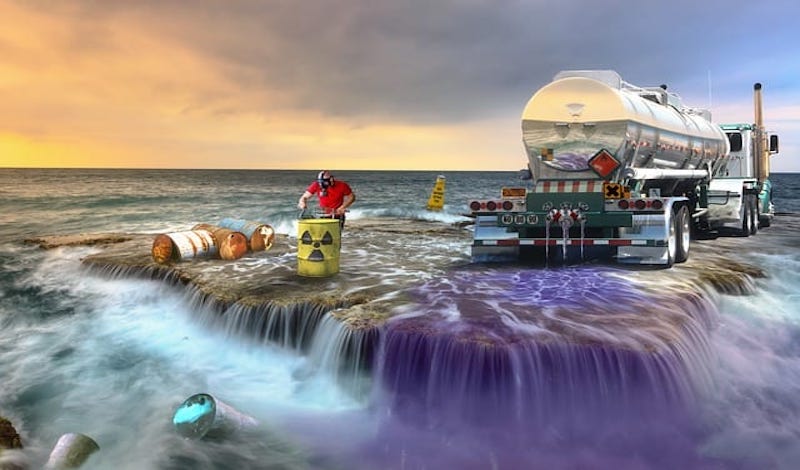MANAGING EDITOR ZHI JIAO DANIELLE GOH WRITES — Dumping radioactive water into the ocean. Is this the making of a sequel to “Godzilla vs. Kong,” the surprise success film of the pandemic era?
No. To everyone’s disappointment, this plot will be executed in reality. After 10 years of the Fukushima Daiichi nuclear disaster, the Japanese government has decided on Tuesday, April 13th 2021, to start releasing treated radioactive water from the damaged Fukushima nuclear plant into the Pacific Ocean in 2023.
It all started 10 years ago. A magnitude 9.0 earthquake on March 11, 2011, struck Japan, sending tsunami waves of 56 feet (17 meters) onto many coastal areas of the country, which were then devastated. The tsunami also destroyed the coastal nuclear plant, damaging its power supply and cooling systems as well as causing meltdowns at reactors No.1, 2 and 3.

In order to cool the reactors and prevent further damage, the Japanese government had to pump water into them. Since then, plant operator Tokyo Electric Power (TEPCO) has built more than 1000 tanks to hold some 1.25 million tons of contaminated water at the site. These tanks are expected to fill up by 2022, so TEPCO is struggling to build more storage tanks while decommissioning the nuclear plant.
Currently, the radioactive water is being treated in a complex filtration and pumping process known as ALPS (Advanced Liquid Processing System). The system ensures that melted uranium fuel rods remain cool and filter out most of the radioactive elements.
But the ALPS process cannot remove all radioactive isotopes, so that some, including tritium – a radioactive isotope of hydrogen that is hard to separate from water-remains. Tritium is considered harmless because it does not emit enough radiation to penetrate human skin. Yet ingesting it can increase cancer risks. Nevertheless, before pumping the contaminated water into the ocean, TEPCO plans to dilute the contaminated water until tritium levels fall below regulatory limits. The government has also promised that the release process will meet international standards, and says that it has been endorsed by the International Atomic Energy Agency (IAEA).
The decision to dispose of the water has drawn both domestic and international attention. Local fishery industries have been trying to recover from the banning of seafood that has been caught off Japan’s north-eastern coast since the 2011 disaster. The dumping of water would further deteriorate customers’ confidence in their products. Both China and South Korea, Japan’s neighbors, are deeply concerned about these planned actions.
Chinese foreign ministry spokesman Zhao Lijian urged Japan to “act in a responsible manner,” adding that “this issue is very significant, so Japan needs to be responsible to the international public interests, which is also being responsible to the Japanese people’s interests”.
South Korea is also “firmly opposed” and Koo Yun-cheol, Minister of South Korea’s Office for Government Policy Coordination, said the plan was “absolutely unacceptable”. He urged Japan to be transparent in its treatment of the water and to verify that it can safely proceed with the proposed dumping action.

According to a German Marine Scientific Research Institute, once the waters are dumped in the ocean, radioactive materials could spread to most of the Pacific Ocean within 57 days and all oceans within a decade. Given the United States’ proximity to the Pacific Ocean, it is surprising that the U.S. has supported Japan’s decision and has actually thanked Japan for “its transparent efforts in its decision to dispose of the treated water from the Fukushima Daiichi site.,” as tweeted by Secretary of State Anthony Blinken.
Greenpeace, an international non-governmental environmental organization, recently published a report on alternatives to the current decommissioning plans, which could stop the increase of contaminated water before 2022. Nonetheless, this dumping of water into the oceans remains at this time the cheapest option.
Other experts such as Ken Buesseler, a senior scientist at the Woods Hole Oceanographic Institution in Massachusetts who has studied the waters around Fukushima, are also worried about non-tritium radioactive contaminants that could “accumulate more readily in seafood and sea floor sediments”.
Japan isn’t the first country to dispose of radioactive waste in the ocean. Before 1993, there were no international laws preventing countries from doing so. From 1946 through 1993, thirteen countries, including the United States, the United Kingdom and Russia have used the ocean to dispose of nuclear waste. A few studies in the late 20th century have concluded that the environmental impact is negligible. Yet no major studies were conducted in the 21st century to follow up on the issue.
So, would the Fukushima wastewater plan be sufficiently safe? Or must we consider other, perhaps costlier measures? An unsafe, environmentally unsound process could cost Japan, the continent and the planet beyond any monetary measure.


Let’s use some numbers to get some perspective on this Fukushima Tritium.
The amount of Tritium stored in those tanks is approx 7 x 10^13 Bq.
The amount of Tritium produced naturally each year from cosmic rays interacting with our atmosphere is approx 1.4 x 10^17 Bq.
That means we are talking about adding and extra 5 hours of natural Tritium to the oceans. Fukushima happened over 10 years ago. That is 87000 hours ago.
The extra Fukushima Tritium will make no difference to the radiation levels in the world.
What about other quantities of radioactive contaminants such as cesium? The Japan Times reported black rockfish caught near Fukushima containing cesium far in excess of acceptable levels… If every country believes that they are dumping the minimal waste level, it will add up eventually..
before the dump, every japanese must first drink those “safe” radioactive first to prove it is ok.